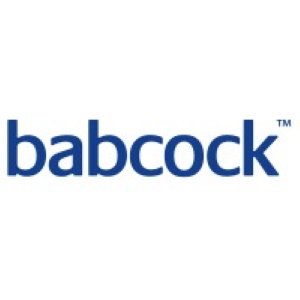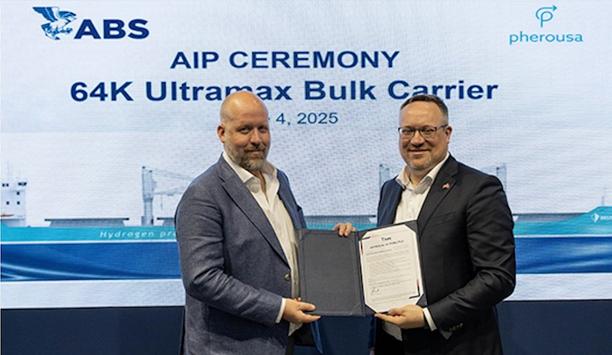Babcock International Group PLC - Experts & Thought Leaders
Latest Babcock International Group PLC news & announcements
ABS issued approval in principle (AIP) to Pherousa Shipping for its ammonia cracking technology onboard ships, featuring proton exchange membrane fuel cells and fuel gas supply system (FGSS) for fully electric propulsion. The emissions-free propulsion system is targeted for application on Pherousa’s Ultramax 64,000 dwt bulk carrier to transport copper, a key material in solar panels and electric cars, in fully emissions-free vessels. Rapid innovation and new developments “We are seeing rapid innovation and new developments around ammonia as an alternative fuel, whether as a carrier of hydrogen or as a fuel in its own right. Cracking ammonia to produce hydrogen for fuel cells is one that has the potential to accelerate the energy transition to low or no carbon emissions in the maritime industry." "ABS is proud to share our deep insight into the safety aspects of ammonia as a marine fuel in supporting development of this capability,” said Patrick Ryan, ABS Senior Vice President and Chief Technology Officer. Development of a zero-emission Emissions-free propulsion system is targeted for application on Pherousa’s Ultramax 64,000 bulk carrier “The approval in principle from ABS marks another important milestone for us in the development of a zero-emission scalable solution for the maritime industry." "It allows us to continue the design and construction of our concept series of 64,000 dwt bulk carriers earmarked for the copper industry, to ensure that this specific commodity, so essential to global decarbonisation, can be delivered across oceans without any carbon footprint at all,” said Hans Bredrup, Chairman of Pherousa AS. Key partners in the project Key partners in the project include the designers Deltamarin, the flag state Marshall Islands, Babcock International Group, which supplies the FGSS, as well as Metacon, the technology developer and shareholder of Pherousa. ABS provides industry-pioneering guidance on the application of ammonia as a marine fuel.
LGE business has been awarded a contract to deliver six cargo handling and fuel gas supply systems for Ultra Large Ethane Carriers in China. The new supersized ships have 50% more capacity than existing Very Large Ethane Carriers (VLEC), and at 150,000 m3, are a world first of this size. Transportation of liquefied gas The ships, being built at the Jiangnan Shipyard in China, will be fitted with cascade reliquefication plants to manage the Boil Off Gas (BOG), with the contract signalling a continued wave of demand for the globally sought technology in a buoyant market for the transportation of liquefied gas. Neale Campbell, Managing Director of Babcock’s LGE business, said: “The development of these ships is a milestone moment as the industry enters the new era of Ultra Large Ethane Carriers. We are proud that our pioneering-edge technology is an intrinsic part of these game-changing vessels, with an integrated reliquefaction system and fuel gas supply system providing fuel to the ship’s main engine – helping to support a net-zero future.” LGE’s intellectual property portfolio The LGE business saw a record order intake of more than £300 million in the first half of 2024 The integrated system comprises of LGE’s SuperCooler™ and ecoETHN™ technologies – both part of LGE’s intellectual property portfolio. SuperCooler™ improves plant efficiency by increasing reliquefaction capacity whilst reducing energy consumption, while ecoETHN™ integrates the reliquefaction plant with the fuel gas supply system, utilising methane-rich Boil Off Gas as fuel for the main engine and auxiliary power generators. The LGE business saw a record order intake of more than £300 million in the first half of 2024, with 63 contracts from international shipyard customers driven by major LNG projects in the Middle East and growing demand in China. ecoSMRT® for LNG reliquefaction Ongoing technology development by LGE this year has already achieved eight patent applications, two patents granted, and eleven trademarks granted across the portfolio range, including for LNG, Ammonia, and CO2. Sales have also been strong across the technology-rich portfolio, including the ecoSMRT® for LNG reliquefaction, ecoETHN® for Ethane Cargo Handling Systems, and 18 Ammonia ship Cargo Handling Systems. The success of the LGE business was also formally recognised by the award of King’s Award for Enterprise in the Innovation category.
Babcock has officially launched a new International Engineering and Technology Hub in Melbourne, Australia as part of their increased research and development efforts across global defence markets. The $3.5 million state-of-the-art Abbotsford facility will serve as a collaborative environment for engineers and technologists working in areas such as systems engineering, secure communications, autonomy, artificial intelligence and digitally-enabled asset management. It includes provision for specialist laboratories and other security-accredited testing facilities to simulate, model and validate new technologies so they can be brought into service quickly. Extensive supply chain network The move to the new facility follows a period of sustained growth for the Australian business The hub has been designed with future defence needs in mind and is strategically located in Victoria to leverage the state’s extensive supply chain network, well-credentialled academic institutions and rich engineering talent pool. Part-funded by the Victorian Government, the facility is expected to create as many as 100 new highly skilled jobs over the next three years and will play a crucial role in their workforce development initiatives, contributing to the growth of a robust and resilient industrial base. The move to the new facility follows a period of sustained growth for the Australian business, particularly in Melbourne, where their defence workforce has grown seven-fold since 2019.









































